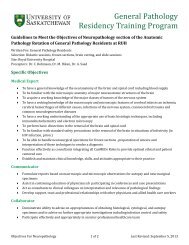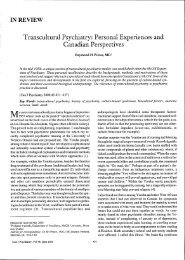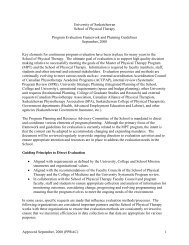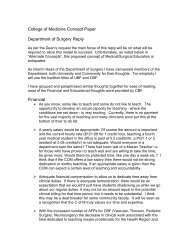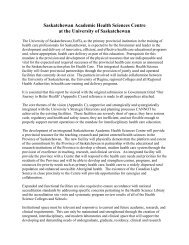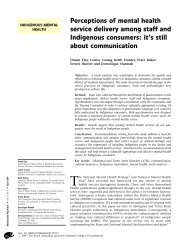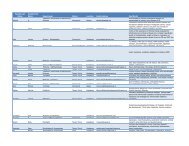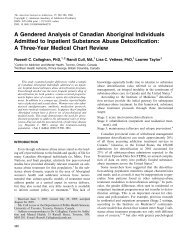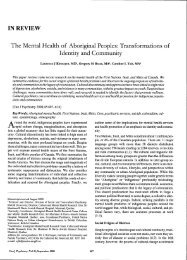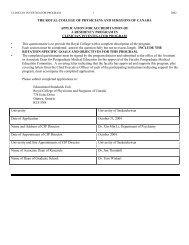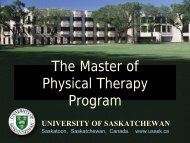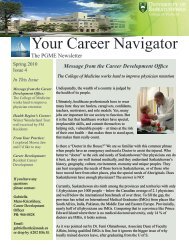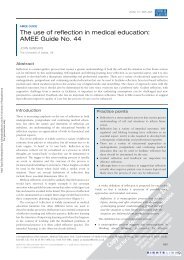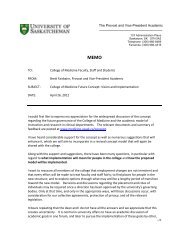COMMUNIQUé - College of Medicine - University of Saskatchewan
COMMUNIQUé - College of Medicine - University of Saskatchewan
COMMUNIQUé - College of Medicine - University of Saskatchewan
Create successful ePaper yourself
Turn your PDF publications into a flip-book with our unique Google optimized e-Paper software.
Smart cities,<br />
healthy kids<br />
For the first time in modern history, the<br />
life expectancy <strong>of</strong> children may well drop<br />
lower than that <strong>of</strong> their parents. The reason:<br />
lifestyles that discourage physical activity<br />
and foster obesity.<br />
“To a large extent, the way we behave<br />
is shaped by our environment,” says Dr.<br />
Nazeem Muhajarine. “We tend to develop<br />
sedentary lifestyles if we don’t have a lot <strong>of</strong><br />
opportunities for physical activity, or have<br />
competing activities that discourage us<br />
from being active.”<br />
Muhajarine, leads the Healthy Children<br />
research program within the <strong>Saskatchewan</strong><br />
Population Health and Evaluation Research<br />
Unit (SPHERU), which includes researchers<br />
from the <strong>University</strong> <strong>of</strong> <strong>Saskatchewan</strong><br />
and <strong>University</strong> <strong>of</strong> Regina. Their “Smart<br />
Cities, Healthy Kids” project is looking at<br />
the design <strong>of</strong> urban neighbourhoods in<br />
Saskatoon to identify the elements that<br />
encourage children to get up and go.<br />
These elements include things such as<br />
buildings, roadways, sidewalks, parks, and<br />
green spaces, and how they contribute<br />
to increasing children’s physical activity.<br />
By learning what is and isn’t working<br />
in Saskatoon, the team hopes to inform<br />
the design <strong>of</strong> future neighbourhoods<br />
throughout <strong>Saskatchewan</strong> and<br />
across Canada.<br />
Through their research, Muhajarine and his<br />
team also seeks to shed light on how the<br />
social contexts in which children live —<br />
their families and their neighbourhood —<br />
help or hinder them in their early years. This<br />
is the type <strong>of</strong> research that he thrives on.<br />
“We have done studies looking at various<br />
factors—from family, neighbourhoods,<br />
schools, and larger society—that impact<br />
children, beginning with even before<br />
they are born to when they begin school,”<br />
Muhajarine says. “What do we see in a<br />
community that is essential to nurturing<br />
healthy children that grow up to be welladjusted,<br />
productive citizens? How can we<br />
provide these essentials?”<br />
In addition to the “Smart Cities, Healthy<br />
Kids” project, Muhajarine and his<br />
research team are also working on many<br />
other research and knowledge transfer<br />
projects in early childhood development.<br />
“I think the funding early in my career as a student<br />
(from SHRF’s precursor) has helped me start on a healthy<br />
career path, to really make a difference and contribute<br />
to <strong>Saskatchewan</strong> and elsewhere.”<br />
—Dr. Nazeem Muhajarine<br />
research<br />
They are just about to wrap up a threeyear<br />
evaluation <strong>of</strong> the effectiveness <strong>of</strong><br />
KidsFirst, the provincial government’s<br />
early childhood development program<br />
for vulnerable families with young<br />
children delivered locally at nine sites in<br />
the province. KidsFirst uses home visiting<br />
to mentor parents and connect them to<br />
needed supports, so they can be the best<br />
parents they can be, and have the healthiest<br />
children possible. Muhajarine is looking at<br />
the impact KidsFirst has made on children<br />
and their parents’ lives in the first few years<br />
<strong>of</strong> the program.<br />
Findings from previous research projects<br />
have contributed to improved programs<br />
and services for children in several ways:<br />
Saskatoon’s school boards have initiated<br />
major literacy programs and have<br />
introduced and expanded a full-time<br />
kindergarten option, while the city’s public<br />
library has improved access to services<br />
in underprivileged areas. Last year, he<br />
received CIHR funding to launch kidSKAN,<br />
the <strong>Saskatchewan</strong> Knowledge to Action<br />
Network for early childhood development<br />
(www.kidskan.ca), a provincial community<br />
<strong>of</strong> practice to connect researchers with<br />
practitioners and policymakers across<br />
the province.<br />
Muhajarine was awarded his first research<br />
grant while he was a doctoral student, from<br />
the <strong>Saskatchewan</strong> Health Research Board<br />
(a precursor to SHRF).<br />
“I believe the early funding really<br />
contributed to my development as a<br />
researcher,” Muhajarine says. “Being funded<br />
when I was fairly new to the research<br />
community as a PhD student was certainly<br />
beneficial when I subsequently applied<br />
for national grants.”<br />
Since his early days as a student, Muhajarine<br />
has continued his success in funding<br />
through a variety <strong>of</strong> post-doctoral and<br />
establishment grants through HSURC<br />
(another precursor to SHRF), and a variety<br />
<strong>of</strong> national funding sources such as the<br />
Canadian Institutes <strong>of</strong> Health Research. He<br />
has won prestigious honours such as CIHR’s<br />
Knowledge Translation Award, and SHRF’s<br />
Achievement Award. n<br />
This story and photograph provided courtesy <strong>of</strong> SHRF.<br />
Photo courtesy Brinnameade Smith.<br />
<strong>University</strong> <strong>of</strong> <strong>Saskatchewan</strong> • <strong>College</strong> <strong>of</strong> <strong>Medicine</strong> C O M M U N I Q U É 9



